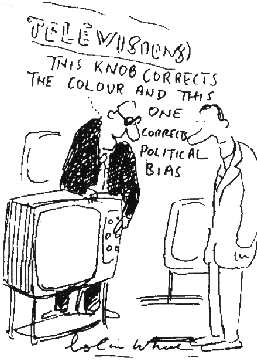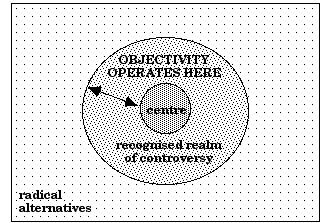| The Media | |
|
|
| Back to Main Menu.. |
| Sphere of Objectivity |
 The
rules of objectivity only apply to a recognised sphere of controversy.
If two sides are not recognised then there is no perceived need
for balance. Some ideological assumptions are "so taken for granted"
by the mainstream media that they don't even recognise them as being
ideological (Ryan 1991, p. 68). Jeff Cohen, executive director of
FAIR, points out that journalists recognise a propaganda of the
left and a propaganda of the right but not a propaganda of the centre.
"Being in the center—being a centrist—is somehow not having
an ideology at all. Somehow centrism is not an "ism" carrying with
it values, opinions and beliefs." (1989) Michael Parenti, author
of Inventing Reality: The Politics of the Mass Media, says: The
rules of objectivity only apply to a recognised sphere of controversy.
If two sides are not recognised then there is no perceived need
for balance. Some ideological assumptions are "so taken for granted"
by the mainstream media that they don't even recognise them as being
ideological (Ryan 1991, p. 68). Jeff Cohen, executive director of
FAIR, points out that journalists recognise a propaganda of the
left and a propaganda of the right but not a propaganda of the centre.
"Being in the center—being a centrist—is somehow not having
an ideology at all. Somehow centrism is not an "ism" carrying with
it values, opinions and beliefs." (1989) Michael Parenti, author
of Inventing Reality: The Politics of the Mass Media, says:
Journalists (like social scientists and others) rarely doubt their own objectivity even as they faithfully echo the established political vocabularies and the prevailing politico-economic orthodoxy. Since they do not cross any forbidden lines, they are not reined in. So they are likely to have no awareness they are on an ideological leash. (Parenti 1986, p. 35) Journalists are free to write what they like if they produce well written stories "free of any politically discordant tones", that is if what they write fits the ideology of those above them in the hierarchy (Parenti 1986, p. 35). A story that supports the status quo is generally considered to be neutral and is not questioned in terms of its objectivity while one that challenges the status quo tend to be perceived as having a "point of view" and therefore biased (Nelson 1989, p. 133). Statements and assumptions that support the existing power structure are regarded as 'facts' whilst those that are critical of it tend to be rejected as 'opinions' (Parenti 1986, p. 50). For example, one study of environmental stories found that: "While the media were willing to dispute dire environmental predictions, they were more accepting of dire economic projections—citing enormous anticipated job losses while rarely asking how the figures were derived, or if plant closings and layoffs were the only options." (Spencer 1992, p. 15) Some questions also remain outside the realm of contested territory. For example Village Voice journalist Daniel Lazare, points out that media reports on energy consumption in the US consistently ignore the cheap and easy availability of fuel and the subsidies and tax concessions supporting oil production and energy consumption in the US as a factor encouraging wasteful consumption. Lazare (1991) blames this on the fact that "taxes remain a dirty word inside Washington and also on "political conformism and cultural insularity" in most newsrooms: "Cheap gas, cars and highways are—unquestionably—the American way."
Cohen, Jeff, 1989, Propaganda from the Middle of the Road: The Centrist Ideology of the News Media, Extra! October/November. McNair, Brian, 1994, News and Journalism in the UK (London and New York: Routledge). Nelson, Joyce, 1989, Sultans of Sleeze: Public Relations and the Media (Toronto: Between the Lines). Lazare, Daniel, 1991, 'Press Ignores the Obvious in U.S. Energy Policy', Extra! May/June, p 4. Parenti, Michael, 1986, Inventing Reality: The Politics of the Mass Media (New York: St Martin's Press). Ryan, Charlotte, 1991, Prime Time Activism: Media Strategies for Grassroots Organizing (Boston, MA: South End Press). |
© 2003 Sharon Beder

 Objectivity
not only stops short of the centre but it also doesn't go too
far away from the centre. Although the media in countries such
as Britain and the US are fairly impartial when it comes to the
spectrum covered by the established political parties they were
much less fair to views outside this establishment consensus:
"Impartiality and objectivity, in this sense, stop at the point
where political consensus ends—and the more radical the dissent,
the less impartial and objective the media." (Ralph Miliband quoted
in McNair 1994, p. 45),
Objectivity
not only stops short of the centre but it also doesn't go too
far away from the centre. Although the media in countries such
as Britain and the US are fairly impartial when it comes to the
spectrum covered by the established political parties they were
much less fair to views outside this establishment consensus:
"Impartiality and objectivity, in this sense, stop at the point
where political consensus ends—and the more radical the dissent,
the less impartial and objective the media." (Ralph Miliband quoted
in McNair 1994, p. 45),